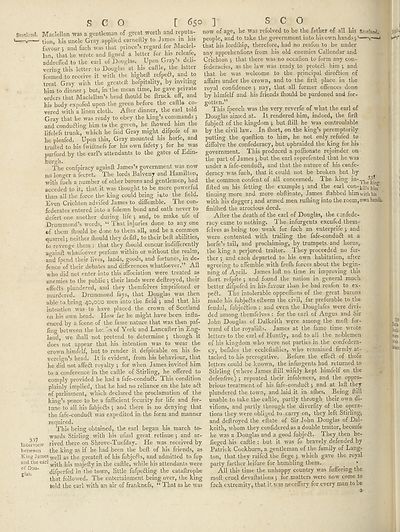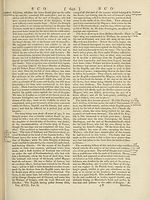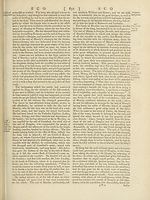Encyclopaedia Britannica, or, a Dictionary of arts, sciences, and miscellaneous literature : enlarged and improved. Illustrated with nearly six hundred engravings > Volume 18, RHI-SCR
(688) Page 650
Download files
Complete book:
Individual page:
Thumbnail gallery: Grid view | List view

SCO
Scotland. Maclellan was a gentleman of great worth and reputa-
l—"v~«—- tion, his uncle Gray applied earnellly to James in ms
favour 5 and fuch was that prince’s regard for Maclel¬
lan, that he wrote and figned a letter for his releafe,
addreffed to the earl of Douglas. _ Upon Gray’s deli¬
vering this letter to Douglas at his callle, the latter
feemed to receive it with the higheft refpedl, and^ to
treat Gray with the greateft hofpitality, by inviting
him to dinner ; but, in the mean time, he gave private
orders that Maclellan’s head flrould be ftruck off, and
his body expofed upon the green before the caftle co¬
vered with a linen cloth. After dinner, the earl told
Gray that he was ready to obey the king’s commands j
and conducing him to the green, he {bowed him the
lifelefs trunk, which he faid Gray might difpofe of as
he pleafed. Upon this, Gray mounted his horfe, and
truffed to his fwiftnefs for his own fafety ; for he was
purfued by the earl’s attendants to the gates of Edin¬
burgh.
The confpiracy againft James’s government was now
no longer a fecret. The lords Balveny and Hamilton,
with fueh a number of other barons and gentlemen, had
acceded to it, that it was thought to be more powerful
than all the force the king could bring into the field.
Even Crichton advifed James to diffemble. The con¬
federates entered into a folemn bond and oath never to
defert one another during life j and, to make ufe of
Drummond’s words, “ That injuries done to any one
of them ftiould be done to them all, and be a common
quarrel; neither ftiould they defift, to their beft abilities,
to revenge them : that they ftiould concur indifferently
againft whatfoever perfons within or without the realm,
and fpend their lives, lands, goods, and fortunes, in de-
fence of their debates and differences whatfoever.” All
who did not enter into this affociation wTere treated as
enemies to the public •, their lands were deftroyed, their
eftefts plundered, and they themfelves imprifoned or
murdered. Drummond fays, that Douglas was then
able to bring 40,000 men into the field } and that his
intention was to have placed the crown of Scotland
on his own head. How far he might have been influ¬
enced by a fcene of the fame nature that was then paf-
fing between the houfes of York and Lancafter in Eng¬
land, we {hall not pretend to determine ; though it
does not appear that his intention was to wear the
crown himfelf, but to render it defpicable on his fo-
vereign’s head. It is evident, from his behaviour, that
he did not affedft royalty ; for when James invited him
to a conference in the caftle of Stirling, he offered to
comply provided he had a fafe-condu£t. This condition
plainly implied, that he had no reliance on the late aft
of parliament, which declared the proclamation of the
king’s peace to be a fufficient fecurity for life and for¬
tune to all his fubjefts *, and there is no denying that
the fafe-conduft was expedited in the form and manner
required.
This being obtained, the earl began his march to¬
wards Stirling with his ufual great retinue ; and ar¬
rived there on Shrove-Tuefday. He was received by
the king as if he had been the beft of his friends, as
King James weg as the greateft of his fubjefts, and admitted to fup
and the earl w*tj1 jjjs majefty in the caftle, while his attendants were
^a^°U" difperfed in the town, little fufpefting the cataftropbe
that followed. The entertainment being over, the king
told the earl with an air of franknefs, “ That as he was
337
Interview
between
[ 650 ] S C u
now of age, he was refolved to be the father of all his ScotlantL
people, and to take the government into his own hands;'—■—v—J
that his lordlhip, therefore, had no reafon to be under
any apprehenfions from his old enemies Callendar and
Crichton ; that there was no occafion to form any con¬
federacies, as the law was ready to proteft him ; and
that he was Avelcome to the principal direftion of
affairs under the crown, and to the firft place in the
royal confidence ; nay, that all former offences done
by himfelf and his friends ftiould be pardoned and for¬
gotten.”
This fpeech was the very reverfe of what the earl of
Douglas aimed at. It rendered him, indeed, the firft
fubjeft of the kingdom ; but ftill he was controulable
by the civil law. In Ihort, on the king’s peremptorily
putting the queftion to him, he not only refufed to
diffolve the confederacy, but upbraided the king for his
government. This produced a paffionate rejoinder on
the part of James ; but the earl reprefented that he was
under a fafe-conduft, and that the nature of his confe¬
deracy was fuch, that it could not be broken but by
the common confent of all concerned. The king in-^33?^
filled on his fetting the example; and the earl comkil]s ^
tinuing more and more obftinate, James ftabbed him with his
with his dagger; and armed men ruftiing into the room, own hands,
finiftied the atrocious deed.
After the death of the earl of Douglas, the confede¬
racy came to nothing. The infurgents exeufcd them¬
felves as being too weak for fuch an enterprife ; and
were contented with trailing the fafe-conduft at a
horfe’s tail* and proclaiming, by trumpets, and horns,
the king a perjured traitor. They proceeded no far¬
ther ; and each departed to his own habitation, after
agreeing to aflemble with frefti forces about the begin¬
ning of April. James loft no time in improving this
{hurt refpite ; and found the nation in general much
better difpofed in his favour than he had reafon to ex-
peft. The intolerable oppreflions of the great barons
made his fubjefts efteem the civil, far preferable to the
feudal, fubjeftion : and even the Douglafes were divi¬
ded among themfelves : for the earl of Angus and Sir
John Douglas of Dalkeith were among the moft for-
ward of the royalifts. James at the fame time wrote
letters to the earl of Huntly, and to all the noblemen
of his kingdom who were not parties in the confedera¬
cy, befides the ecclefiaftics, who remained firmly at¬
tached to his prerogative. Before the effeft of thofe
letters could be known, the infurgents had returned to
Stirling (where James ftill wifely kept himfelf on the
defenfive) ; repeated their infolences, and the oppro¬
brious treatment of his fafe-conduft ; and at laft they
plundered the town, and laid it in allies. Being ftill
unable to take the caftle, partly through their own di-
vifions, and partly through the diverfity of the opera¬
tions they were obliged to carry on, they left Stirling,
and deftroyed the eftate of Sir John Douglas of Dal¬
keith, whom they confidered as a double traitor, becaufe
he was a Douglas and a good fubjeft. They then be-
fieged his caftle : but it was fo bravely defended by
Patrick Cockburn, a gentleman of the family of Langs¬
ton, that they raifed the fiege ; which gave the royal
party farther leifure for humbling them. _ *
All this time the unhappy country rvas fuffering the
moft cruel devaftations ; for matters were iioav come to
fuch extremity, that it was neceffary for every man to ee
Scotland. Maclellan was a gentleman of great worth and reputa-
l—"v~«—- tion, his uncle Gray applied earnellly to James in ms
favour 5 and fuch was that prince’s regard for Maclel¬
lan, that he wrote and figned a letter for his releafe,
addreffed to the earl of Douglas. _ Upon Gray’s deli¬
vering this letter to Douglas at his callle, the latter
feemed to receive it with the higheft refpedl, and^ to
treat Gray with the greateft hofpitality, by inviting
him to dinner ; but, in the mean time, he gave private
orders that Maclellan’s head flrould be ftruck off, and
his body expofed upon the green before the caftle co¬
vered with a linen cloth. After dinner, the earl told
Gray that he was ready to obey the king’s commands j
and conducing him to the green, he {bowed him the
lifelefs trunk, which he faid Gray might difpofe of as
he pleafed. Upon this, Gray mounted his horfe, and
truffed to his fwiftnefs for his own fafety ; for he was
purfued by the earl’s attendants to the gates of Edin¬
burgh.
The confpiracy againft James’s government was now
no longer a fecret. The lords Balveny and Hamilton,
with fueh a number of other barons and gentlemen, had
acceded to it, that it was thought to be more powerful
than all the force the king could bring into the field.
Even Crichton advifed James to diffemble. The con¬
federates entered into a folemn bond and oath never to
defert one another during life j and, to make ufe of
Drummond’s words, “ That injuries done to any one
of them ftiould be done to them all, and be a common
quarrel; neither ftiould they defift, to their beft abilities,
to revenge them : that they ftiould concur indifferently
againft whatfoever perfons within or without the realm,
and fpend their lives, lands, goods, and fortunes, in de-
fence of their debates and differences whatfoever.” All
who did not enter into this affociation wTere treated as
enemies to the public •, their lands were deftroyed, their
eftefts plundered, and they themfelves imprifoned or
murdered. Drummond fays, that Douglas was then
able to bring 40,000 men into the field } and that his
intention was to have placed the crown of Scotland
on his own head. How far he might have been influ¬
enced by a fcene of the fame nature that was then paf-
fing between the houfes of York and Lancafter in Eng¬
land, we {hall not pretend to determine ; though it
does not appear that his intention was to wear the
crown himfelf, but to render it defpicable on his fo-
vereign’s head. It is evident, from his behaviour, that
he did not affedft royalty ; for when James invited him
to a conference in the caftle of Stirling, he offered to
comply provided he had a fafe-condu£t. This condition
plainly implied, that he had no reliance on the late aft
of parliament, which declared the proclamation of the
king’s peace to be a fufficient fecurity for life and for¬
tune to all his fubjefts *, and there is no denying that
the fafe-conduft was expedited in the form and manner
required.
This being obtained, the earl began his march to¬
wards Stirling with his ufual great retinue ; and ar¬
rived there on Shrove-Tuefday. He was received by
the king as if he had been the beft of his friends, as
King James weg as the greateft of his fubjefts, and admitted to fup
and the earl w*tj1 jjjs majefty in the caftle, while his attendants were
^a^°U" difperfed in the town, little fufpefting the cataftropbe
that followed. The entertainment being over, the king
told the earl with an air of franknefs, “ That as he was
337
Interview
between
[ 650 ] S C u
now of age, he was refolved to be the father of all his ScotlantL
people, and to take the government into his own hands;'—■—v—J
that his lordlhip, therefore, had no reafon to be under
any apprehenfions from his old enemies Callendar and
Crichton ; that there was no occafion to form any con¬
federacies, as the law was ready to proteft him ; and
that he was Avelcome to the principal direftion of
affairs under the crown, and to the firft place in the
royal confidence ; nay, that all former offences done
by himfelf and his friends ftiould be pardoned and for¬
gotten.”
This fpeech was the very reverfe of what the earl of
Douglas aimed at. It rendered him, indeed, the firft
fubjeft of the kingdom ; but ftill he was controulable
by the civil law. In Ihort, on the king’s peremptorily
putting the queftion to him, he not only refufed to
diffolve the confederacy, but upbraided the king for his
government. This produced a paffionate rejoinder on
the part of James ; but the earl reprefented that he was
under a fafe-conduft, and that the nature of his confe¬
deracy was fuch, that it could not be broken but by
the common confent of all concerned. The king in-^33?^
filled on his fetting the example; and the earl comkil]s ^
tinuing more and more obftinate, James ftabbed him with his
with his dagger; and armed men ruftiing into the room, own hands,
finiftied the atrocious deed.
After the death of the earl of Douglas, the confede¬
racy came to nothing. The infurgents exeufcd them¬
felves as being too weak for fuch an enterprife ; and
were contented with trailing the fafe-conduft at a
horfe’s tail* and proclaiming, by trumpets, and horns,
the king a perjured traitor. They proceeded no far¬
ther ; and each departed to his own habitation, after
agreeing to aflemble with frefti forces about the begin¬
ning of April. James loft no time in improving this
{hurt refpite ; and found the nation in general much
better difpofed in his favour than he had reafon to ex-
peft. The intolerable oppreflions of the great barons
made his fubjefts efteem the civil, far preferable to the
feudal, fubjeftion : and even the Douglafes were divi¬
ded among themfelves : for the earl of Angus and Sir
John Douglas of Dalkeith were among the moft for-
ward of the royalifts. James at the fame time wrote
letters to the earl of Huntly, and to all the noblemen
of his kingdom who were not parties in the confedera¬
cy, befides the ecclefiaftics, who remained firmly at¬
tached to his prerogative. Before the effeft of thofe
letters could be known, the infurgents had returned to
Stirling (where James ftill wifely kept himfelf on the
defenfive) ; repeated their infolences, and the oppro¬
brious treatment of his fafe-conduft ; and at laft they
plundered the town, and laid it in allies. Being ftill
unable to take the caftle, partly through their own di-
vifions, and partly through the diverfity of the opera¬
tions they were obliged to carry on, they left Stirling,
and deftroyed the eftate of Sir John Douglas of Dal¬
keith, whom they confidered as a double traitor, becaufe
he was a Douglas and a good fubjeft. They then be-
fieged his caftle : but it was fo bravely defended by
Patrick Cockburn, a gentleman of the family of Langs¬
ton, that they raifed the fiege ; which gave the royal
party farther leifure for humbling them. _ *
All this time the unhappy country rvas fuffering the
moft cruel devaftations ; for matters were iioav come to
fuch extremity, that it was neceffary for every man to ee
Set display mode to:
![]() Universal Viewer |
Universal Viewer | ![]() Mirador |
Large image | Transcription
Mirador |
Large image | Transcription
Images and transcriptions on this page, including medium image downloads, may be used under the Creative Commons Attribution 4.0 International Licence unless otherwise stated. ![]()
| Permanent URL | https://digital.nls.uk/193027651 |
|---|
| Attribution and copyright: |
|
|---|
| Description | Ten editions of 'Encyclopaedia Britannica', issued from 1768-1903, in 231 volumes. Originally issued in 100 weekly parts (3 volumes) between 1768 and 1771 by publishers: Colin Macfarquhar and Andrew Bell (Edinburgh); editor: William Smellie: engraver: Andrew Bell. Expanded editions in the 19th century featured more volumes and contributions from leading experts in their fields. Managed and published in Edinburgh up to the 9th edition (25 volumes, from 1875-1889); the 10th edition (1902-1903) re-issued the 9th edition, with 11 supplementary volumes. |
|---|---|
| Additional NLS resources: |
|

